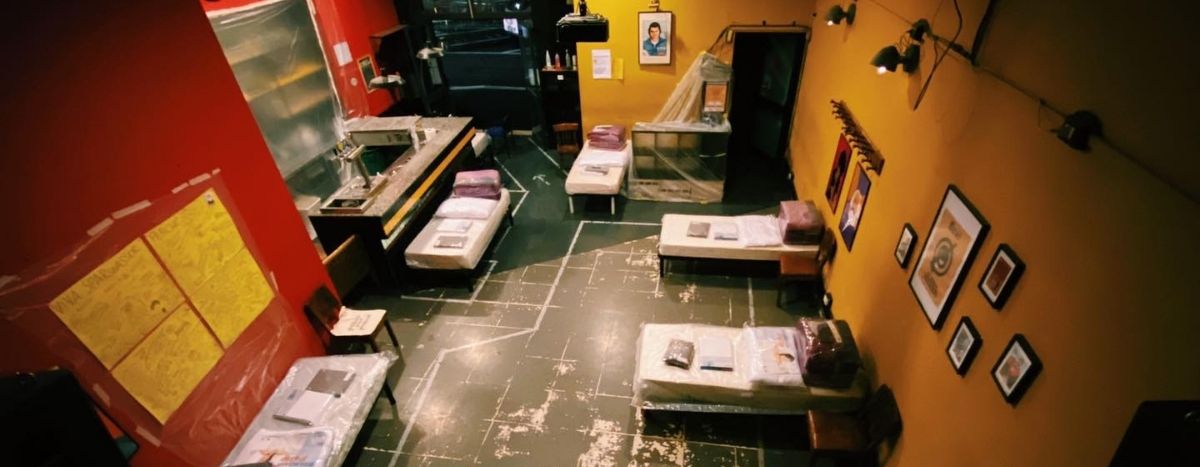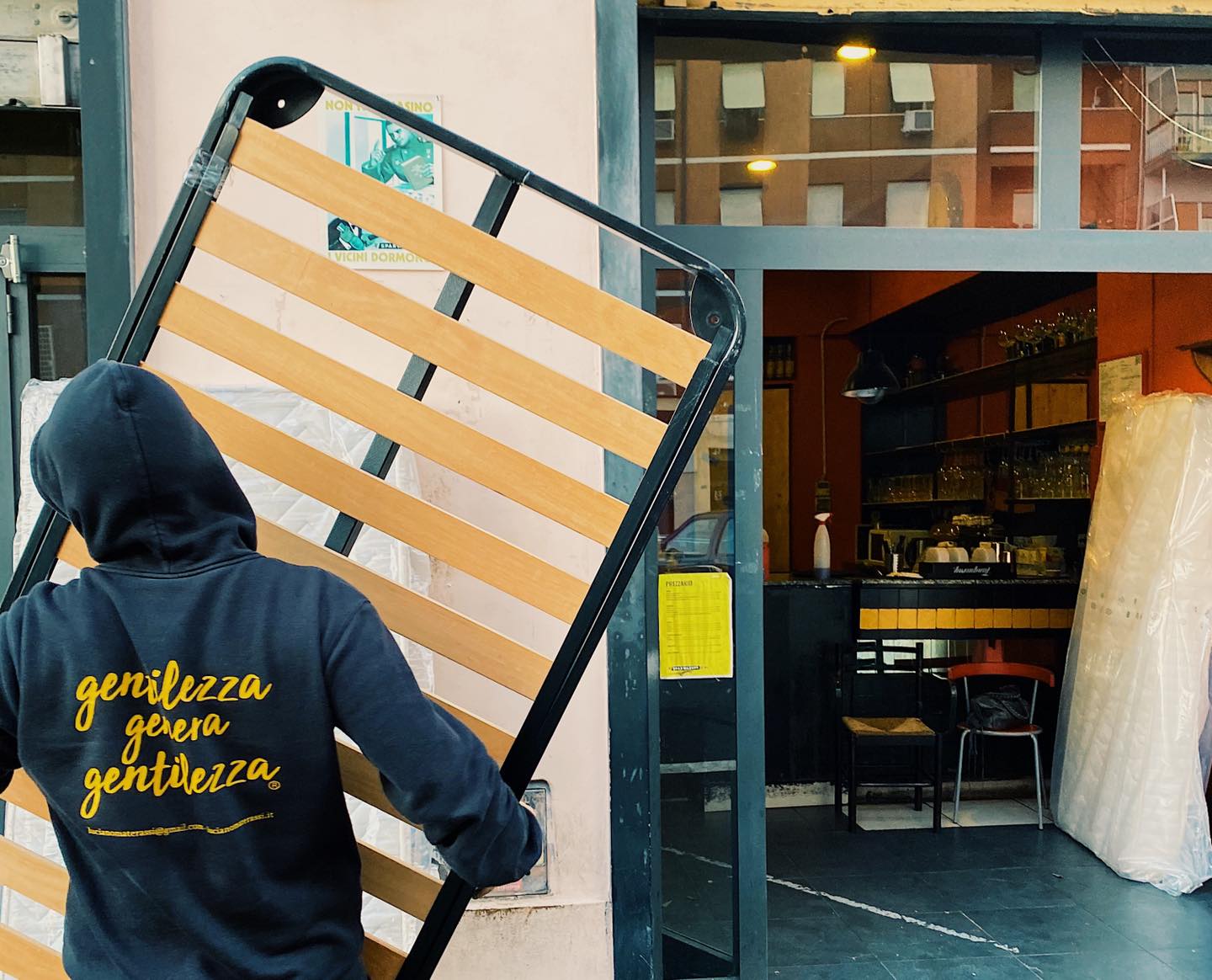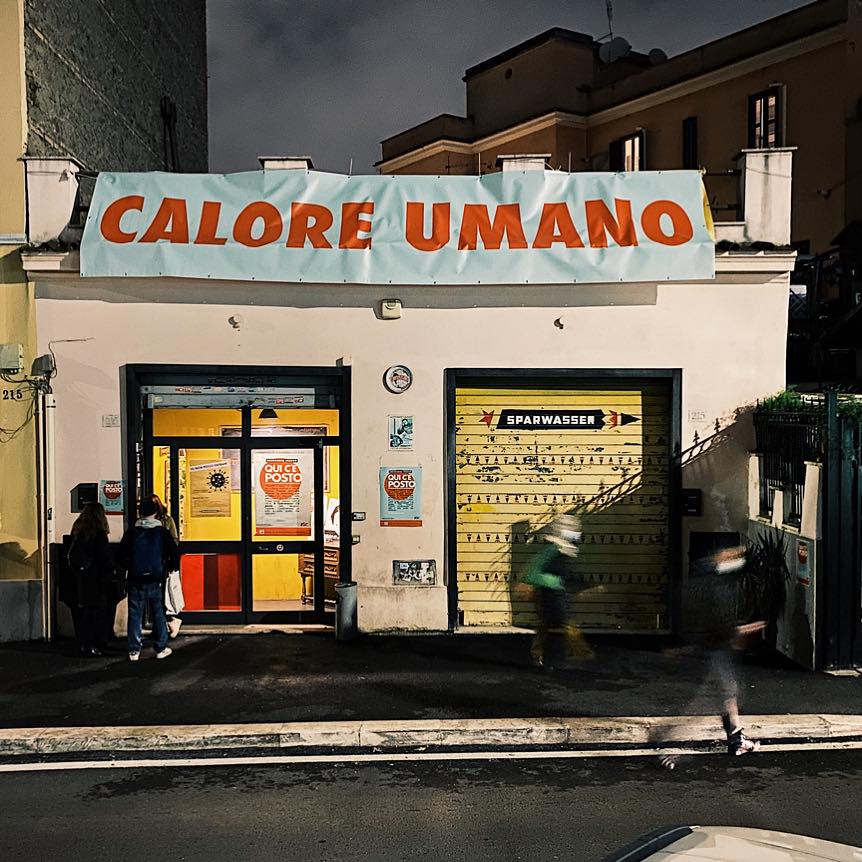
Rome: activists are defying the pandemic to help the city’s homeless
Published on
Translation by:
 Charlie O
Charlie O
In the Italian capital, problems concerning housing have long been in the spotlight. Several thousand people live on the poverty line, at risk of losing their home. Many already have, and Covid-19 has only worsened this issue. Despite difficulties linked to health restrictions, however, associations, communities and volunteers continue to offer their much-needed support.
A little over a year ago, when the pandemic was still in its early stages, the ARCI club known as 'Sparwasser Rome', just like all other public institutions, was told to close its doors. A few days beforehand, Sparwasser had been robbed. To make up for this loss, activists therefore organised a fundraising evening which was attended by a handful of locals. Sparwasser, which came into being 5 years ago, is an important cultural establishment that has brought new life to the city's Pigneto neighbourhood. This is a space which boasts cultural and musical initiatives, book presentations, Italian language schools for migrants, hot desks for co-working and other solidarity and support initiatives.
A year on, nights in Sparwasser look very different. The former dancefloor now serves as a dormitory for seven homeless people. "When the pandemic first started, we were told to end in-person events", explains Clara Mascia, from the social centre's management, "and so we asked ourselves how we could help out in our local area. This is how we started our project - by going shopping for the elderly, remotely helping kids with their homework, creating an online mental-health support station."
When winter arrived in Rome, as was the case in many other cities, actions taken to support those living on the streets proved to be inadequate. In Rome alone, in the first weeks of the season, eleven people died from the cold. "When we decided to start our project, eight people had died in the city", Mascia continues. "Our building was empty, unused... what was Sparwasser doing? Welcoming people who didn't have a bed to sleep in seemed natural to us, and it was the best thing we could do with our venue."
The 'There's Space Here' project, which lasted from 26 January to 31 March 2021, emerged from a collaboration with Nonna Roma, a volunteer group made from Sparwasser members which set out to find solutions for those living in poverty. "Every night, from 6pm onwards people arrive, do a quick covid-test, and then receive a hot meal, made by our volunteers. In the morning, they wake up early, have breakfast, and grab a packed lunch to take with them on their day out in the streets," Mascia explains.

The situation in Rome
The most recent stats, dating back to 2014, show that there are 7700 homeless people in Rome. These are the numbers published in the cognitive survey report on people living in extreme poverty, produced by Istat, together with the Ministry of Labour and Social Policies, the Italian Federation of Organisations for the Homeless (fio.PSD), and Caritas Italiana.
"Knowing how many people live on the streets is very difficult", Elisa Manna, head of the Caritas diocesan study center in Rome explains. "We could estimate somewhere between eight and sixteen thousand people in Rome, but for many reasons since the start of the pandemic, we have seen a huge increase, notably because of job losses associated with the current situation."
According to Manna, this figure is destined to grow significantly when the eviction and layoff freeze is lifted, and this increase can already be seen in the scale of the requests for food that Caritas received during the lockdown. "We saw so many young families, with young kids, who had never come to us for help before. I was shocked by one couple's story - both worked in the restaurant sector, and suddenly found themselves without a job, and now depended on us for supplies," Manna continues.
“In Rome, there are around 200,000 people in emergency accommodation”
Fabio Gui, who since the 80's has been a volunteer at the comunità di Sant’Egidio, a Catholic organisation which deals with welcoming and supporting those living in poverty, explains that the people to take into consideration aren't just those already living on the streets. "In Rome, there are around 200,000 living in emergency accommodation," he says. "We're dealing with a city within a city, and it is impossible to say who among these may end up on the streets. There are young couples who lost their jobs, elderly people who are alone, but also those who can no longer pay their bills. Amongst these, there are at least 8,000 who are permanently living on the streets."
For years now, an architect called Enrico Puccini has occupied himself with tracking the data about and possible solutions to this issue. He is the author of a blog called Osservatorio Casa Roma in which he analyses and explains the housing policies in the capital. "There is a huge housing crisis in Rome, and there is a lack of community spirit towards this issue, a lack of willingness to properly look into it," Puccini says. He then underlines that "we need to start from the numbers - if they are not organised, studied and analysed, how can we have a real image of the city?"
"For example," he continues, "no new council houses are being built, and those already standing are no longer suitable to house those who need them - in the past, families were huge, and houses are therefore too big nowadays, given that the modern family has changed in appearance, now often being made up of just one person."
One of the most important things for those who don't have a house is having an address
People often use a fake address on official documents, or rather, a street which doesn't exist but stands in as a legal equivalent for a real address. "Having a fictitious address," Gui explains, "means having access to a number of essential rights, like basic healthcare, for example, or an ID or health card. Therefore, it means officially existing, and being able to exercise your rights."
In Rome, this address is Via Modesta Valenti, a street which doesn't actually exist, but which refers to the story of a homeless woman who lived on the streets near Termini station and was left without any assistance. On 31 January 1983 she happened to fall ill, and an ambulance crew refused to treat her for several hours on the basis that she was 'dirty'. She died there, in the midst of several hundred people, completely alone. From that moment on, her name became symbolic of what was no longer acceptable: abandoning people who live out on the streets.
Hospitality during the pandemic
In addition to the ordinary management of the reception of homeless people, every year there are two "emergencies", those related to the summer heat, and the winter cold.
As Gui points out, in Rome, a large percentage of homeless people live in the central areas of the city, near the stations where they can find shelter at night, and the markets, restaurants and bars where they can find food during the day. During lockdown, all of these places were closed. "Even the toilets in bars that they used to wash were closed. Rome was deserted, while these people wandered around looking for food', Gui says. "Here in the Sant'Egidio community, we transformed the cafeteria into a food delivery area, and organised takeaway lunches that we went to deliver to people living on the streets around the city. But Rome wasn't prepared for this kind of situation."
Even the Caritas reception centres had to limit their intake in order to comply with social distancing guidelines, as Elisa Manna explains: "It wasn't possible to maintain our usual numbers in the same location, and we did everything we could to find people places to sleep in any and all suitable places, especially parishes... but it wasn't enough to meet demand."

More than just beds
Operators are reporting a fall in available spaces and a rise in demand for said spaces. However, there has been an overwhelming response from new volunteers; citizens who have made themselves available to help. Sparwasser has been an important part of this. "When we decided to launch the 'There's Space Here' project", continues Mascia, "we made a call for volunteers in the area and the response was huge. We received mattresses and blankets from a cooperative, volunteers came along to help us prepare meals, a doctor helped with COVID testing, and other members in the area offered breakfasts... the fundraising went far beyond our expectations."
"We instantly started getting to know our guests", Mascia concludes, "and they told us about their problems. One person had just been made redundant, while there were others who couldn't find jobs, and we asked ourselves how we could help them. We thought about offering psychological support, helping them in their job hunt, or with putting together a CV. These people were living through difficulties and searching for a way out. Nowadays, they spend Saturdays helping to deliver COVID care packages to people in need on behalf of Nonna Rima. Our goal is to accompany these people on a journey that goes beyond the emergency alone, because it's not all just about the health situation.. there's a journey in itself to be undertaken too."
Translated from A Roma si prova a far “posto” per i senza dimora: il progetto del circolo Sparwasser


